Three cases of Korean students dealing with oppression by immigration officials as part of a recent crackdown ~ By Martha Vickery (Summer 2025)
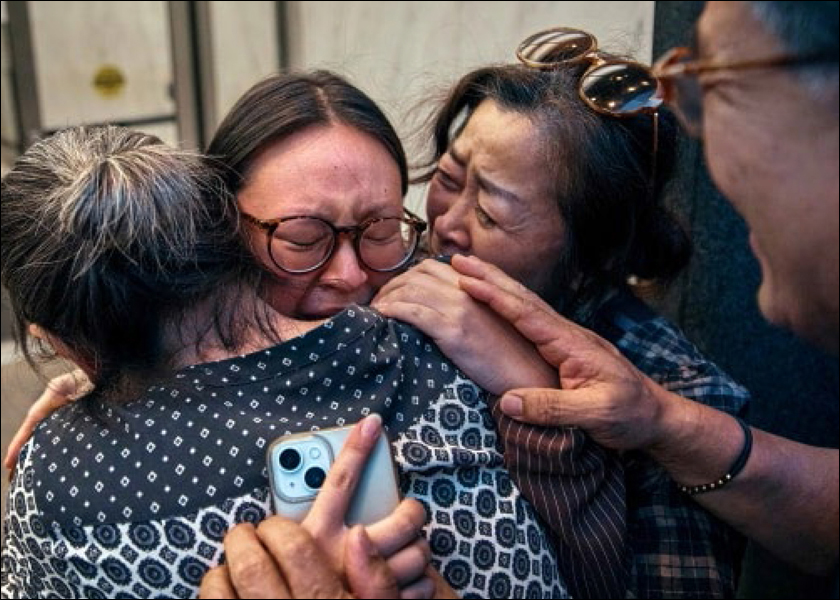
On July 21, a Korean American legal permanent resident, Tae Heung “Will” Kim, was detained by Customs and Border Patrol (CBP) at the San Francisco Airport and held there for more than a week, with no chance to consult with an attorney.
After that week of being locked up, sleeping on a chair in a room where the lights were on 24 hours a day, and being denied contact with the outside world, he was transferred to a detention center in Arizona. He is now reportedly detained at another ICE facility in Texas, his state of residence, awaiting a September 4 hearing at which the government must make a case for his deportation.
Kim’s ICE detention and incarceration is one of three recent detentions (and attempts at detention) by Immigration and Customs Enforcement (ICE) involving three adult Korean students who are living in the U.S. legally.
Beyond the fact that all three are students, and ethnically Korean, these three cases are also alike in that the U.S. government is claiming that they are subject to deportation due to some minor infraction of law. In the times before this recent crackdown, such infractions would not have been considered deportable offenses. One of the students was arrested because of what ICE claims is an expired visa, which, even if true, would be a civil offense, not a (deportable) criminal offense.
All three have received support from immigration advocacy groups, and their stories have received positive news coverage as a result. Notably, one of the students has filed suit against the Trump Administration for violation of her Constitutional rights to free speech.
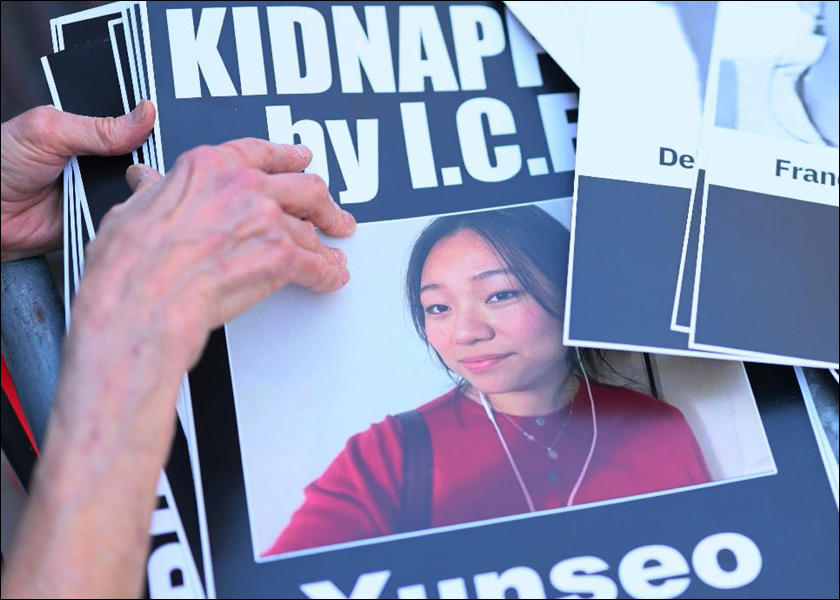
The targeting of legal residents and current visa holders
The similarities and many differences of these cases are emblematic of how greater numbers of legal immigrants, across a wide spectrum of ages and life circumstances, are being targeted. People are routinelly detained and arrested in airports by customs agents, or kidnapped off the streets by masked and unidentifiable ICE agents, held without access to legal help, and denied their constitutional rights.
Although the national focus has been on the large numbers of Latino immigrants, particularly in California, who have been indiscriminately rounded up in workplaces and shopping centers, the Asian American community nationwide is also in peril of Trump administration recent anti-immigrant crackdowns.
According to Becky Belcore, executive director at the National Korean American Service and Educational Consortium (NAKASEC), the reason lies in the statistics – the Asian American community is the only racial group that is still a majority immigrant population. Sixty-seven percent percent of Asian American adults are immigrants, and 54 percent of the Asian American population overall are immigrants, she said.
Students seem to be a particular focus of the recent crackdown. A recent State Department report shows that 41 percent of F-1 (student) visa applications were denied in the 2023-2024 fiscal year, the highest denial rate in a decade. As of August 20, 6,000 student visas were revoked by the Trump Administration, and some students are mounting legal challenges to these revocations, according to a report in Inside Higher Ed. In some cases, courts have reversed the revocations.
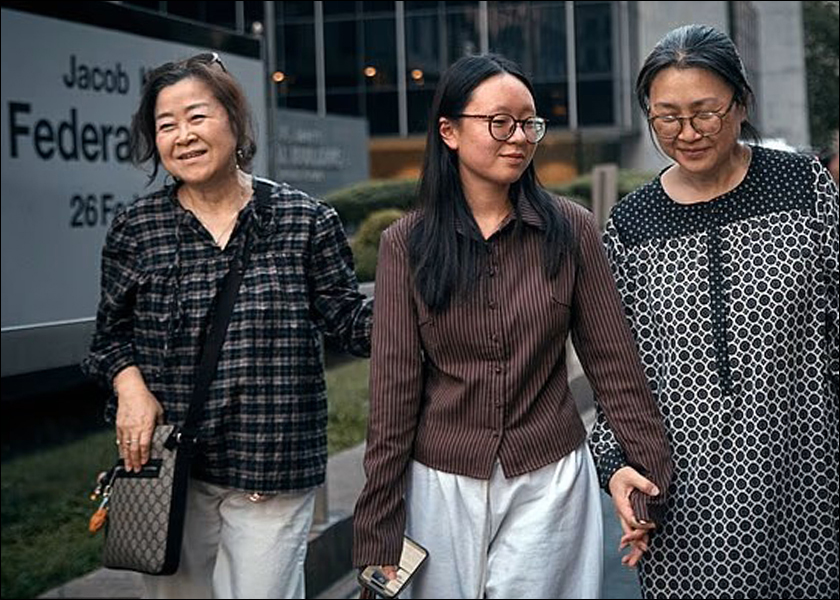
Two students imprisoned without access to counsel, on no specific charges
The cases of Kim and Purdue University student Yeonsoo Go are alike in that both were held, at least at first, without access to legal counsel, and without formal charges being filed against them. Being held without access to communication and without a charge obviously introduces a level of fear and intimidation into the process, compared to the conventional and Constitutional process of being under arrest on a specific charge and having the right to speak to an attorney about disputing that charge.
Yeonsoo Go, age 21, was arrested by ICE July 31 outside a federal courthouse in New York after reporting for a routine visa hearing. Go was first held at a Manhattan facility, then flown to an ICE detention center in Louisiana before being released on August 5.
While ICE contended that Go’s R-2 visa expired more than two years ago, the Episcopal Diocese immigration attorney Mary Rothwell Davis, in a report in the Episcopal News Service, said it is unclear why Go was detained for an expired visa when her visa is not set to expire until December 2025. Davis explained that Go was in the process of applying to convert her current visa to a student visa. She said the hearing had gone very well on July 31, just before Go was arrested, that the judge had apparently been satisfied with her visa status, and had granted Go a hearing date for late August.
Go’s mother is Episcopal priest Rev. Kyrie Kim, who works for the Episcopal Diocese of New York. Go’s original R-2 visa, issued to religious workers, was issued to both mother and daughter in 2021 so they could live in the U.S. together while Go’s mother took a clergy position for the diocese.
During the five days of Go’s detention, the Episcopal Church community along with the immigrant rights community publicized Go’s detention, and united in several rallies to call attention to it.
ICE waits at courthouses
Youngwoon Han, organizing director for NAKASEC, which has worked to raise awareness of these cases, said ICE is making a practice of arresting people at courthouses. These are typically immigrants following the legal requirements of their residency and attending hearings to renew their visas. This practice is obviously a disincentive for legal residents to follow the law.
Han said there is widespread concern in the community about this ICE practice, evidenced by the large number of calls to NAKASEC’s immigration hotline by people worried about going to their hearings for fear of being detained.
According to a report by the HANA Center of Chicago, the new national budget has the capacity to harm immigrants in numerous ways. It funnels an unprecedented $170.7 billion to immigration enforcement, while cutting funding for critical services like food assistance, healthcare and legal aid. These are programs that millions, immigrants and U.S. citizens alike, rely on every day.
The budget also imposes “new, punitive application fees on immigration protections, which are expected to go into effect before the end of the federal fiscal year in October 2025” according to the HANA Center report.
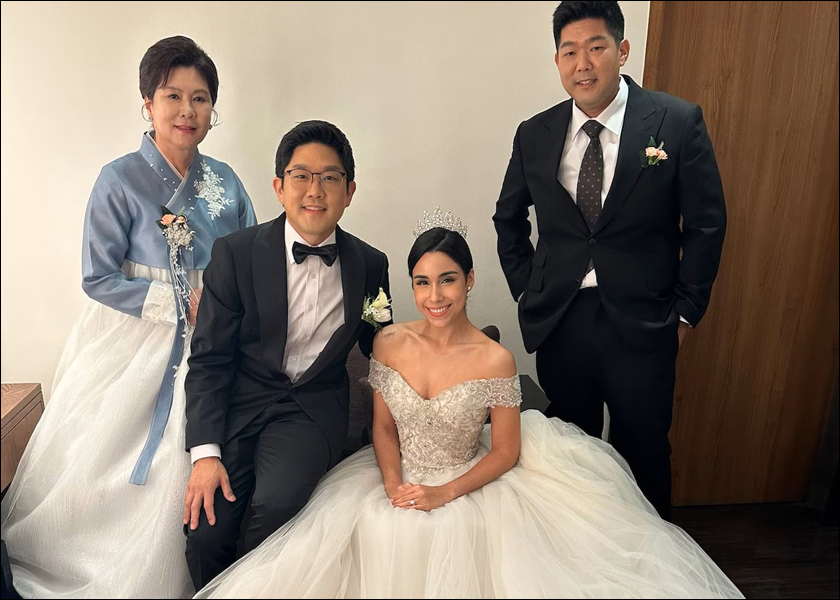
Kim – denied legal counsel, detained at an airport
Of the three students, Kim is the oldest, at age 40, and has lived in the U.S. the longest, since age five. He was arrested in the San Francisco airport upon arriving from South Korea after a two-week trip to attend his brother’s wedding. According to his attorney Eric Lee, the cited reason for his arrest was a 2011 misdemeanor drug conviction for marijuana possession.
Lee said that Kim had completed the required community service sentence at the time for the misdemeanor offense, and followed the appropriate legal procedure to get that record sealed, but the government used it anyway.
Kim is currently a Ph.D. candidate studying infectious disease at Texas A&M University; his specialty is in researching a vaccine for Lyme disease, a non-curable tick-borne disease that infects 476,000 people annually in the U.S. according to the Center for Disease Control.
Kim’s is the most urgent of the three, because he is still incarcerated. He was transferred from the airport to an ICE facility in Arizona, and transferred again to another ICE facility in Raymondville, Texas. He has recently received a “notice to appear” on September 4 in immigration court in Texas.
NAKASEC held a press conference by Zoom on July 31, 10 days after Kim was detained. In his remarks, his attorney Eric Lee said he spent a week trying to find out where Kim was being held and what the charge was. At the time of the press conference there was still little information on whether Kim would be released from detention, or whether he would be detained indefinitely until immigration proceedings. His attorneys were permitted one meeting with Kim, but only after more than a week of detention. Lee said he also spoke by phone to ICE officials who were at the airport and in charge of Kim’s detention.
Kim’s case is an example of why poor treatment of immigration detainees is a rising concern among immigration advocates. Paul Krooth, Kim’s immigration attorney, explained during the press conference that the fact that his client was detained in an airport is itself problematic, since it is not an authorized detention facility. There is no healthy food, nowhere to get good sleep, no access to the outdoors, and no medical care.
There are also no set rules about the care of detainees applicable to an airport, Krooth added, making his client’s status in terms of legal rights more precarious. Kim’s mother Sharon Lee said that her son has asthma and she did not know if he had access to his medication. NAKASEC has received no recent update on Kim since the press conference, Han said.
Han noted during the press conference that his office at NAKASEC reached out to two U.S. senators in California, as well as to Rep. Nancy Pelosi, whose district covers San Francisco. They also called the office of Michael McCaul, the U.S. representative whose 10th district includes Kim’s residence. NAKASEC also alerted two Korean American members of Congress, Rep. Young Kim of California, and Sen. Andy Kim of New Jersey, Han said.
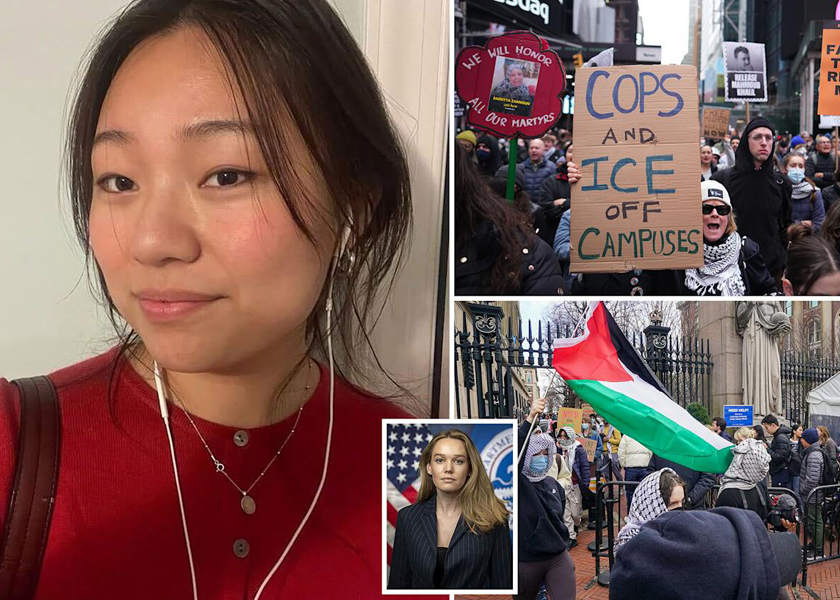
A suit to enforce First Amendment rights
Student Yunseo Chung’s ordeal began in March, and is unique in that Chung, an undergraduate student at Columbia University, and a permanent resident, was pursued by ICE but never arrested.
In March, ICE searched her dorm room and reportedly went to her parents’ home, but did not find her. She went into hiding and simultaneously filed suit against U.S. government for depriving her of her First Amendment rights to free speech.
In early 2025, while a student at Columbia, Chung was arrested and paid a fine for a trespassing charge in connection to a pro-Palestine advocacy demonstration on the Barnard College campus. The government’s attempts to detain and deport her were linked to that arrest and accused her of anti-Semitic activities.
A search warrant, unsealed at the June 5 hearing, shows that Secretary of State Marco Rubio authorized the citing of a rarely-used federal statute in the warrant: it concerns concealing or harboring an alien.
A memo by Rubio describes how Chung’s and fellow Columbia student and pro-Palestine activist Mahmoud Kalil’s participation in “antisemitic protests and disruptive activities” served to “undermine U.S. policy to combat anti-Semitism around the world and in the United States,” and that his determination was based in part on Chung’s “citations for unlawful activity” at the protests.
Kalil, who was a leader of the pro-Palestine student movement at Columbia, was captured and detained by ICE, and released after 100 days. The judge who ruled to release him specified that Kalil’s First Amendment rights were violated. The government has appealed.
Chung’s lawsuit was upheld at the June 5 hearing. Southern District of New York Judge Naomi Buchwald issued a preliminary injunction prohibiting ICE from arresting or detaining her. Chung’s case was backed by several civil rights organizations, including Notdutdol for Korean Community Development. Chung did not appear at the June 5 hearing, but about a dozen supporters sat in the audience.
According to a report from Nodutdol, a New York-based advocacy organization that has been supporting Chung, the government asked the judge to dismiss Chung’s lawsuit. The judge rejected this argument, and pointed out that ICE has failed to issue Chung a notice to appear in immigration court. A post from Nodutdol suggests that the absence of any criminal charge against Chung is a government tactic to keep her in a “a legal gray area and prevent her from challenging the legality of its decisions.“
Immigration rights groups take action on many fronts
Many non-profit immigration and legal advocacy groups are filing suits, often collaboratively, to defend due process and other Constitutional rights – particularly to halt the so-called “expedited removal” of immigrants to another country. “Expedited removal,” begun by the Trump administration, means being deported before having a chance to make a case in court before removal.
In March, according to a report by the Justice Action Center of Los Angeles, several immigrant rights groups jointly filed a lawsuit to halt Trump administration’s attempts to strip certain immigrants of their due process rights. The suit , filed in the district court in Washington, DC, is a collaboration of the UndocuBlack Network (UBN), the Coalition for Humane Immigrant Rights (CHIRLA), and the national immigration rights group CASA, with legal representation from Justice Action Center.
Chung’s suit is also supported by several legal rights groups, including: The Creating Law Enforcement Accountability & Responsibility (CLEAR) Project of the City University of New York; the asylum advocacy organization Human Rights First; and the Lawyers’ Committee for Civil Rights. The court’s upholding of Chung’s charge means she will be able to pursue her prosecution of the Trump Administration. Chung’s suit, and others like to defend the Constitutional rights of immigrants, have the potential to neutralize the administration’s attempts to prosecute and/or deport immigrants without due process.
Chung’s suit is a drop in the bucket of many lawsuits by both legal immigrants and U.S. citizens who have been wrongfully treated by ICE and other government authorities in recent crackdowns. However, the bucket is filling up as more individuals and groups jump to the defense of immigrants.
Misery for the innocent and waste for taxpayers
There is much harm and waste in imprisoning and prosecuting individuals who have done no crime and are in the country legally. There is the wasted time and resources for individuals, along with the trauma, misery and physical harm, and many life disruptions that result from immigration detention of innocent people.
Attorney Lee remarked, during the press conference on Will Kim’s detention, “The manner in which Customs and Border Protection held Will incommunicado for over a week and denied him his most basic rights as a member of the people of this country should shock us, not only because of Will’s absolutely critical research work trying to find a vaccine for Lyme disease, or because of his 35 years of residency, but because it tells us something deeply concerning about the attitude of this administration to the Constitution, which after all Trump attempted to overthrow on January 6, 2021, and which he later said he planned to terminate. We are now seeing what that looks like.”
Lee also remarked on the cost of Trump’s huge reallocation of funding toward mass deportations, specific to what it would mean to the state of Texas, where Kim is incarcerated, and where recent flooding has destroyed billions in infrastructure and property and caused many injuries and deaths. The question came from a reporter covering the community that is part of Texas A&M University, where Kim works.
“The Department of Homeland Security, instead of providing necessary resources to help Texans who are going through this devastating situation, is directing immense amounts of resources away from FEMA and away from helping people deal with natural disasters,” said Lee. “They are locking up, then flying people like Will around the country – spending thousands of dollars to punish this individual who is engaged in research that will save the lives of people in Texas and all over by providing a vaccine for Lyme disease.”
The case of Will Kim is an opportunity for people to realize “whether they voted for Donald Trump in the last election or not” Lee said, “that the anti-immigration crackdown that this administration is launching is based on a lie,” he said. “The goal was never to make America safer – the goal was never to make America healthier. The goal was to create the infrastructure for an attack on the rights of everybody – citizens and non-citizens alike. And that’s why this case is so important.”
Belcore said Kim’s situation is urgent, and symbolizes many whose cases are not well known. “Our goal is for everybody to know about what is happening to Will Kim. Because we want him to be released, but also because his case is representative of many people being disappeared by CBP and ICE. So it can symbolize a larger call for this to stop. We will continue to advocate to members of Congress, and also other elected officials to reach out to other decisionmakers to help make his release happen and work with his legal team for his release.”
Editor’s note: NAKASEC’s Know Your Rights immigration hotline is:1-844-500-3222 and its website is: www.nakasec.org. NAKASEC’S Know Your Rights app can be downloaded free at: https://nakasec.org/resources/know-your-rights/


